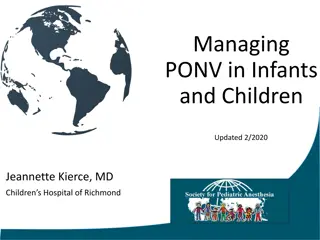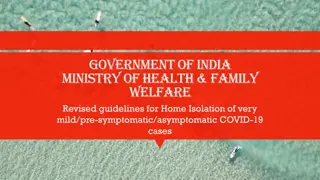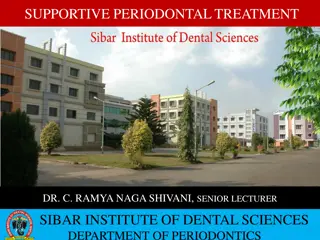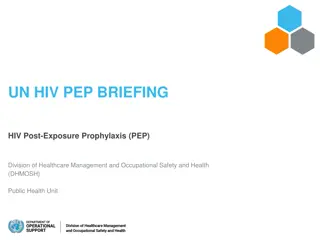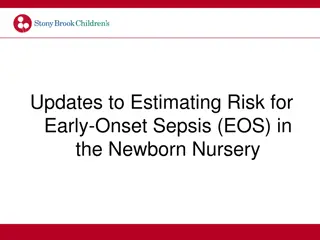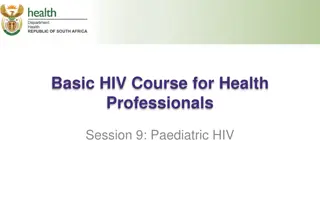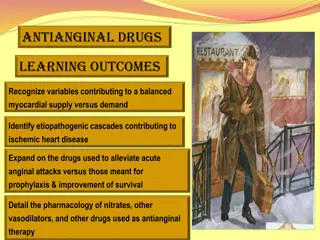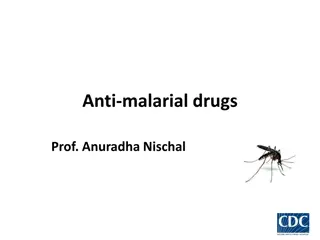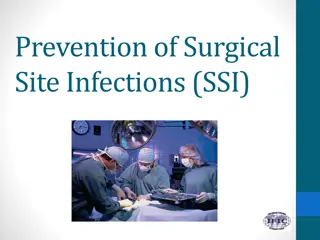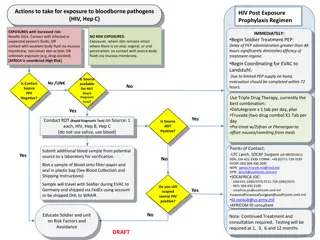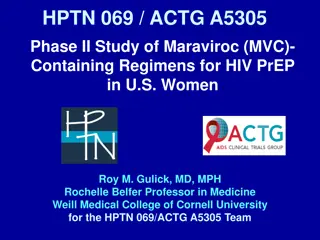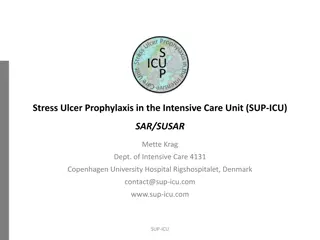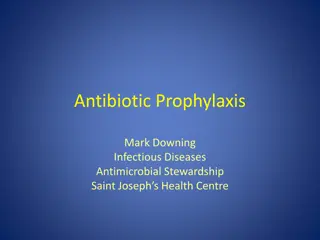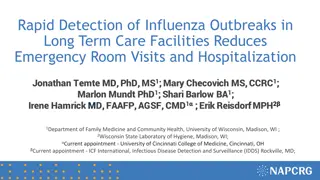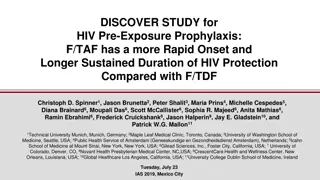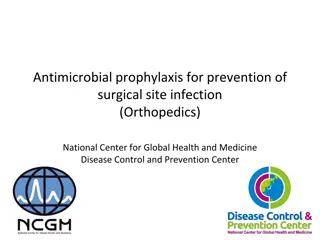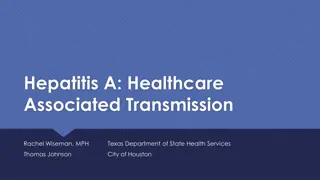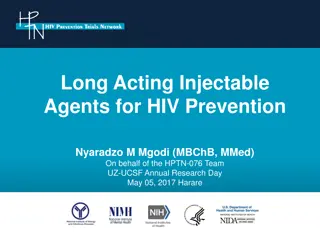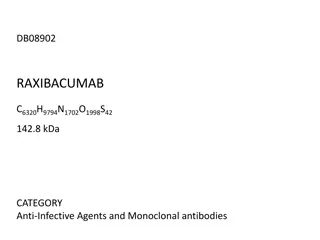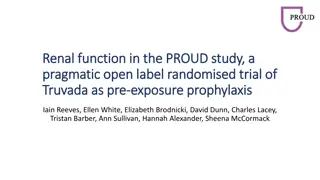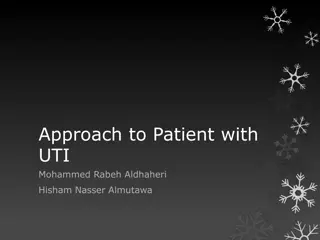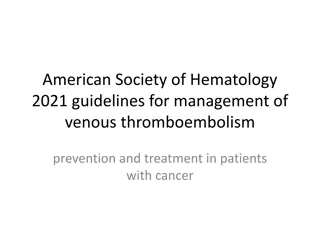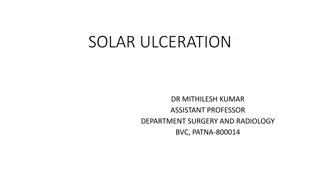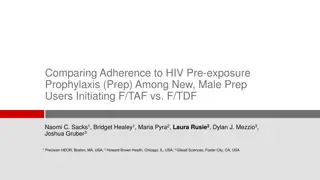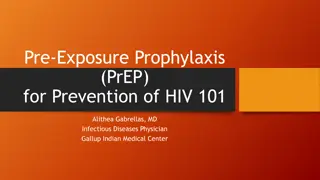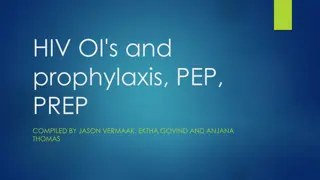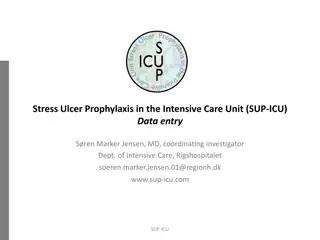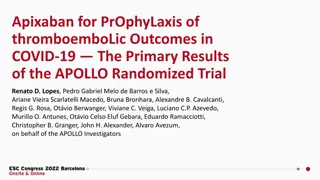Comprehensive ICU Protocol for Sedation, Analgesia, and Delirium Control by Dr. Vinod Srivastava
This comprehensive ICU protocol by Dr. Vinod Srivastava, an Associate Professor in Anaesthesiology & Critical Care at KGMU, covers key aspects such as sedation, analgesia, delirium assessment and control, stress ulcer and deep vein thrombosis prophylaxis, and glycaemic control in the ICU setting. Th
1 views • 50 slides
Surgical Prophylaxis and Antimicrobial Selection Guidelines in Surgery
Surgical prophylaxis involves administering antibiotics before contamination of previously sterile tissues to prevent infections. Common pathogens in surgical site infections include skin flora like S. aureus. Antimicrobial selection is based on the surgical procedure, likely pathogens, and safety c
4 views • 19 slides
Update on HIV and AIDS Prevention Guidelines 2022
This update highlights key points from the PMK No. 23/2022 on combating HIV, AIDS, and STIs. It covers terminologies, goals for eliminating HIV and AIDS by 2030, and strategies such as PrEP and PEP. The guidelines emphasize timely interventions like Post-Exposure Prophylaxis (PEP) and Pre-Exposure P
3 views • 38 slides
From Data to Options: Advances in STI Prevention
Explore insights shared by Dr. Hyman M. Scott on trends in sexually transmitted infections, the impact of doxycycline prophylaxis, and potential effects of meningitis vaccination on STI rates. Gain understanding of rising STI rates in the US, chlamydia and gonorrhea cases, and recommendations for ST
3 views • 43 slides
Managing Postoperative Nausea and Vomiting in Infants and Children
Postoperative nausea and vomiting (PONV) is a significant concern in pediatric patients due to their increased risk compared to adults. This presentation by Dr. Jeannette Kierce covers the pathophysiology, risk factors, prophylaxis, and rescue treatments for PONV in infants and children, emphasizing
0 views • 34 slides
Revised Guidelines for Home Isolation of COVID-19 Cases in India
The Ministry of Health & Family Welfare in India has issued revised guidelines for home isolation of very mild/pre-symptomatic/asymptomatic COVID-19 cases. Patients eligible for home isolation must have the necessary facility for self-isolation. Special considerations apply to elderly patients and t
2 views • 16 slides
Understanding Supportive Periodontal Treatment in Periodontics
Supportive Periodontal Treatment (SPT) is a crucial phase in periodontal therapy aimed at preventing disease recurrence and tooth loss. It involves regular maintenance and monitoring to manage periodontal conditions effectively. SPT includes thorough examinations, radiographic reviews, and prophylax
1 views • 61 slides
Understanding HIV Post-Exposure Prophylaxis (PEP) and Prevention
HIV Post-Exposure Prophylaxis (PEP) is a crucial emergency medical response for individuals exposed to HIV, aiming to prevent infection. It involves a regimen of medications, tests, and counseling services initiated within 72 hours of exposure. HIV transmission occurs through body fluids like blood,
3 views • 27 slides
Understanding Rabies: Causes, Symptoms, and Prevention
Rabies is an acute and highly fatal viral disease of the central nervous system, caused by Lyssavirus type 1. It is a zoonotic disease that affects warm-blooded animals such as dogs, cats, bats, racoons, skunks, and foxes. The disease is primarily transmitted to humans through the bite of a rabid an
2 views • 6 slides
Key Changes in Global Fund's Grant Cycle 7 (GC7) for 2023-2025 Allocation Cycle
New Programme Essentials introduced in GC7 focus on critical interventions to achieve global targets on HIV, TB, and Malaria, emphasizing human rights, gender equality, and community responses. The essentials cover areas such as HIV prevention, testing, treatment, and care, including key elements li
1 views • 27 slides
Understanding Early-Onset Sepsis (EOS) Risk Factors and Management in Newborns
Neonatal Early-Onset Sepsis (EOS) is a rare but life-threatening condition primarily caused by Group B Streptococcus (GBS) or Escherichia coli. Recognizing risk factors such as maternal age, intrapartum fever, GBS colonization, and certain neonatal characteristics is crucial for timely evaluation an
0 views • 26 slides
Paediatric HIV Testing and Treatment Guidelines
Understanding the importance of early diagnosis in HIV-infected infants and children is crucial for timely intervention and improved health outcomes. This session covers testing algorithms, initiation of antiretroviral therapy, viral load monitoring, and legal issues related to HIV testing in childr
2 views • 31 slides
Antibiotic Prophylaxis Compliance in Rural Queensland Hospitals
Antibiotic prophylaxis is crucial in surgeries to prevent infections. This study aims to determine compliance with prophylactic antibiotic use in surgeries conducted at Gympie, Dalby, and Kingaroy general hospitals in Southeast Queensland. The primary objective is to compare adherence to guidelines
0 views • 18 slides
Biomedical Recommendations for Doxycycline Post-Exposure Prophylaxis
This clinical guideline discusses the use of doxycycline post-exposure prophylaxis (PEP) to prevent bacterial sexually transmitted infections (STIs) such as syphilis, chlamydia, and gonorrhea. It provides evidence-based recommendations for offering doxy-PEP to individuals engaging in condomless sex
0 views • 10 slides
Comprehensive Treatment Guidelines for Acute Ischemic Stroke
In the management of acute ischemic stroke, the primary goals are to reduce secondary brain damage, maintain adequate perfusion, and prevent recurrent strokes by managing risk factors. Treatment includes maintaining tissue oxygenation, correcting volume status and electrolytes, managing blood glucos
0 views • 20 slides
Understanding Antianginal Drugs and Treatment Options
Recognize the variables contributing to balanced myocardial supply and demand, identify etiopathogenic cascades in ischemic heart disease, and learn about drugs for acute angina relief and prophylaxis. Delve into the pharmacology of nitrates, vasodilators, and other antianginal therapies. Explore th
2 views • 18 slides
Understanding Malaria: Causes, Symptoms, and Treatment
Malaria, caused by the Plasmodium parasite and transmitted through the bite of infected mosquitoes, is a major global health concern leading to millions of illnesses and deaths annually. The life cycle of the parasite involves different stages in the human host and the mosquito vector. Effective ant
1 views • 107 slides
Prevention of Surgical Site Infections: Key Factors and Recommendations
Surgical site infections (SSIs) are a significant concern in healthcare settings, with 25% of healthcare-associated infections being SSIs. They are preventable, but still pose challenges due to multifactorial causes. Risk factors include uncontrolled diabetes, obesity, smoking, and length of preoper
2 views • 28 slides
New Drugs and Edits in MO HealthNet Pharmacy Program Advisory Committee Meeting - April 2023
The MO HealthNet Pharmacy Program Advisory Committee Meeting in April 2023 discusses new drugs and clinical/fiscal edits. Notable introductions include Etranacogene Dezaparvovec-drlb for Hemophilia B, Noxafil for prophylaxis of fungal infections, and Tzield for delaying Stage 3 type 1 diabetes onset
0 views • 11 slides
Bloodborne Pathogens Exposure: HIV Post Exposure Prophylaxis Regimen
Take immediate action for exposure to bloodborne pathogens like HIV and Hepatitis C through a post-exposure prophylaxis (PEP) regimen. Administer PEP within 48 hours for increased-risk exposures like needle sticks or contact with infected fluids. Coordinate evacuation if needed and conduct Rapid Dia
0 views • 5 slides
Study of Maraviroc-Containing Regimens for HIV PrEP in U.S. Women: HPTN 069/ACTG A5305 Phase II Study
HPTN 069/ACTG A5305 is a Phase II study evaluating the safety and tolerability of Maraviroc (MVC)-containing regimens compared to Tenofovir/emtricitabine (TDF/FTC) for HIV Pre-Exposure Prophylaxis (PrEP) in at-risk women. The study involves a randomized, double-blind, placebo-controlled design with
0 views • 18 slides
Exploring the Use of PrEP to Reduce HIV Transmission Among African American Men
In response to the HIV/AIDS pandemic, this study focuses on the effectiveness of Pre-Exposure Prophylaxis (PrEP) in reducing HIV transmission among African American men who have sex with men in Orangeburg, SC. The research aims to investigate the impact of PrEP compared to condom use, and the necess
0 views • 6 slides
Stress Ulcer Prophylaxis in ICU - Adverse Reactions Reporting Guidelines
Guidelines for reporting adverse reactions in Stress Ulcer Prophylaxis in the Intensive Care Unit (SUP-ICU), including definitions of Adverse Reactions (AR), Serious Adverse Reactions (SAR), Adverse Events (AE), Serious Adverse Events (SAE), SARs in SUP-ICU, and SUSARs. Specific conditions considere
0 views • 8 slides
Antibiotic Prophylaxis in Perioperative Care
Explore the rational approach to perioperative antibiotic use, the importance of antibiotic stewardship in the operating room, and guidelines for selecting and administering antibiotics to prevent surgical site infections. Understand when antibiotic prophylaxis is necessary, which antibiotics to use
0 views • 44 slides
Rapid Influenza Outbreak Detection in Long-Term Care Facilities
The research investigates the effectiveness of rapid diagnostics in detecting influenza outbreaks in long-term care facilities. A non-blinded, randomized controlled trial in Wisconsin LTCFs showed that the intervention led to higher oseltamivir prophylaxis use, decreased ED visits, hospitalizations,
0 views • 6 slides
F/TAF vs. F/TDF for HIV Pre-Exposure Prophylaxis: DISCOVER Study Findings
Study results reveal that F/TAF provides rapid onset and longer sustained HIV protection compared to F/TDF in pre-exposure prophylaxis. The randomized noninferiority trial included 2694 participants with a primary analysis at weeks 48 and 96. Disclosure statements indicate involvement of various hea
0 views • 21 slides
Antimicrobial Prophylaxis for Surgical Site Infection Prevention in Orthopedics
Surgical site infections (SSIs) are common and costly healthcare-associated infections, accounting for a significant percentage of nosocomial infections. Defined by the CDC, SSIs occur within 30 days of surgery and have clinical criteria such as purulent exudate, positive cultures, or surgeon diagno
0 views • 10 slides
Hepatitis A Healthcare-Associated Transmission Investigation
Investigation into hepatitis A transmission involving two nurses in Fort Bend County and Harris County, Texas, who worked for a pediatric home healthcare agency. Contact tracing efforts reveal exposures among patients, household contacts, and other nurses, leading to monitoring for symptoms and admi
0 views • 26 slides
Long-Acting Injectable Agents for HIV Prevention Research Overview
Background on the challenges of daily oral PrEP for HIV prevention and the potential of long-acting injectable agents like Rilpivirine (TMC278) in providing an alternative solution. The HPTN-076 study investigates the safety and acceptability of TMC278.LA for HIV pre-exposure prophylaxis. Key questi
0 views • 29 slides
Raxibacumab: Monoclonal Antibody for Inhalational Anthrax
Raxibacumab is a human IgG1 monoclonal antibody designed to treat and prevent inhalational anthrax caused by Bacillus anthracis. It targets the protective antigen component of the anthrax toxin, inhibiting its binding to cellular receptors and preventing toxin entry. Administered via IV infusion, Ra
0 views • 6 slides
Renal Function Monitoring in the PROUD Study: Truvada Pre-Exposure Prophylaxis Trial
Renal function in the PROUD study, a pragmatic open-label randomized trial of Truvada as pre-exposure prophylaxis, was monitored closely. No significant safety concerns were found, with similar renal adverse events between the placebo and Truvada groups. Regular monitoring included baseline serum cr
0 views • 16 slides
Understanding UTI: Types, Causes, Diagnosis, and Management
Explore the comprehensive approach to urinary tract infections (UTIs) covering types (cystitis, pyelonephritis), common organisms, patient presentations, diagnostic techniques, referral indications, management strategies, prophylaxis, and patient education. Understand the impact of UTIs on different
0 views • 58 slides
Understanding Headaches: Types, Misconceptions, and Management Guidelines
Headaches are a common medical complaint affecting a significant portion of the population. This presentation delves into the various types of headaches, addresses common misconceptions such as sinus headaches and eye strain, and provides guidelines for the primary care management of headaches in ad
0 views • 54 slides
American Society of Hematology 2021 Guidelines for Venous Thromboembolism in Cancer Patients
The American Society of Hematology (ASH) 2021 guidelines provide recommendations for preventing and treating venous thromboembolism (VTE) in cancer patients. The guidelines cover primary prophylaxis for hospitalized medical patients and those undergoing surgery, emphasizing the use of thromboprophyl
0 views • 23 slides
Understanding Solar Ulceration in Cattle
Solar ulceration is a circumscribed reaction in cattle affecting the pododerm, characterized by erosive defects. It is often linked to excessive weight-bearing and abnormal claw conditions. Signs include lameness and exposure of sensitive tissues, with treatment involving trimming, wound care, and a
0 views • 8 slides
Comparing Adherence to HIV Pre-exposure Prophylaxis (PrEP) Among New Male PrEP Users Initiating F/TAF vs. F/TDF
This study aims to describe real-world use patterns and HIV seroconversion rates for individuals using emtricitabine/tenofovir disoproxil fumarate (F/TDF) vs. emtricitabine/tenofovir alafenamide (F/TAF) as pre-exposure prophylaxis (PrEP) for HIV prevention. The retrospective analysis includes newly
0 views • 9 slides
Comprehensive Guide to Pre-Exposure Prophylaxis (PrEP) for HIV Prevention
Learn about the importance of Pre-Exposure Prophylaxis (PrEP) for preventing HIV acquisition in sexually active individuals, including the need for HIV testing, indications for PrEP, and identifying acute HIV infection. This guide emphasizes the significance of offering PrEP to all at-risk individua
0 views • 31 slides
HIV Opportunistic Infections and Prophylaxis Overview
Opportunistic infections (OI) are a major concern for individuals with HIV, often accelerating disease progression and causing severe complications. Prophylactic measures such as TB prophylaxis, Clo-trimazole, and Fluconazole are essential to prevent OIs and improve the overall health outcomes of pe
0 views • 16 slides
Stress Ulcer Prophylaxis in ICU Data Entry System - SUP-ICU Overview
Dive into the Stress Ulcer Prophylaxis in the Intensive Care Unit (SUP-ICU) data entry system led by Dr. Soeren Marker Jensen. Explore screening, randomization, site overview, and data entry processes. Access participant details, edit submitted data, and learn about data entry guidelines. Enter the
0 views • 28 slides
Apixaban for Thromboembolic Prophylaxis in COVID-19: APOLLO Trial Results
Patients with COVID-19 are at higher risk of thrombotic events, and antithrombotic regimens have shown varied results in previous trials. The APOLLO trial investigated the use of apixaban for prophylaxis in outpatients with additional risk factors. Results indicated that low-dose apixaban did not si
0 views • 18 slides




